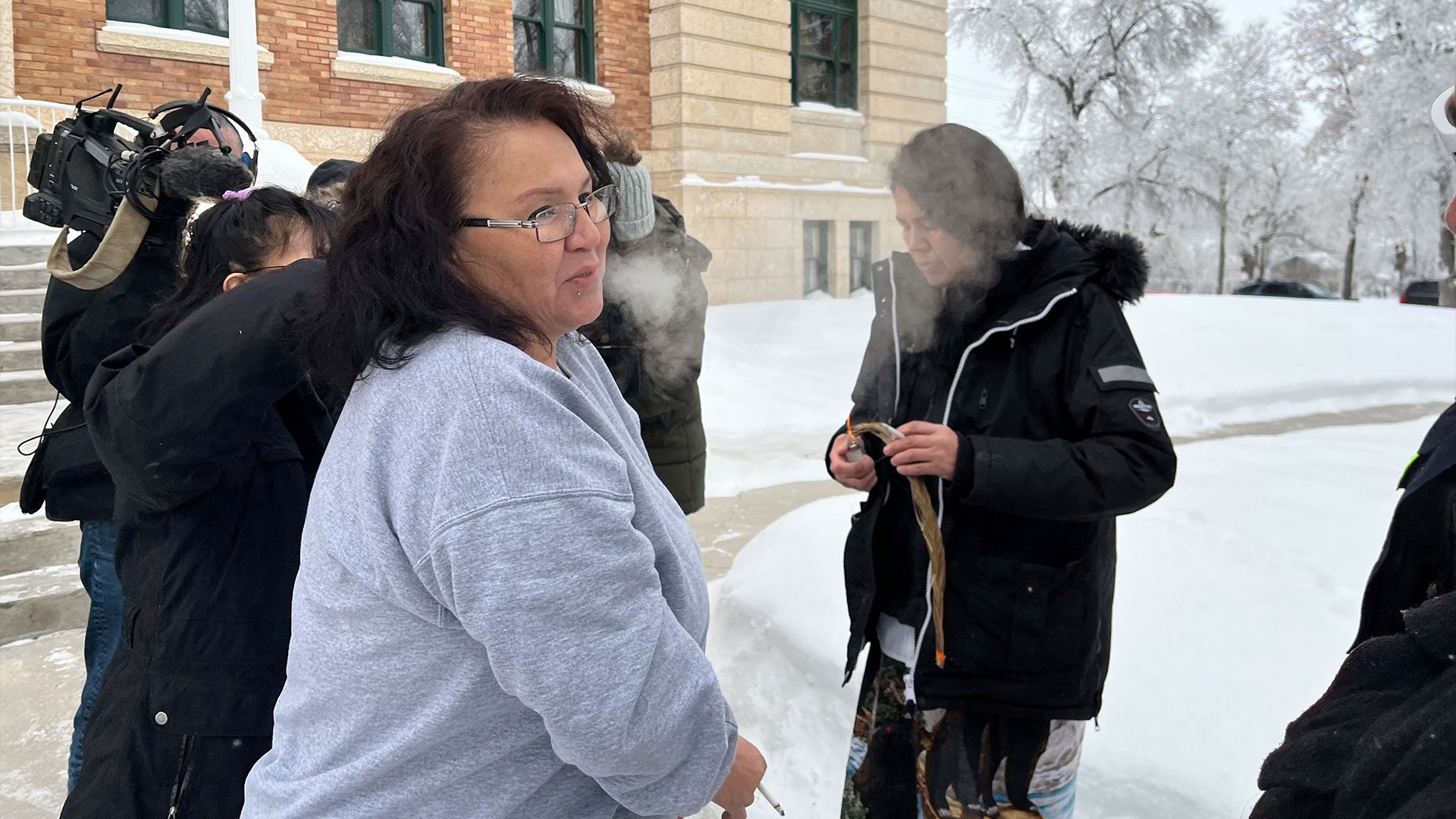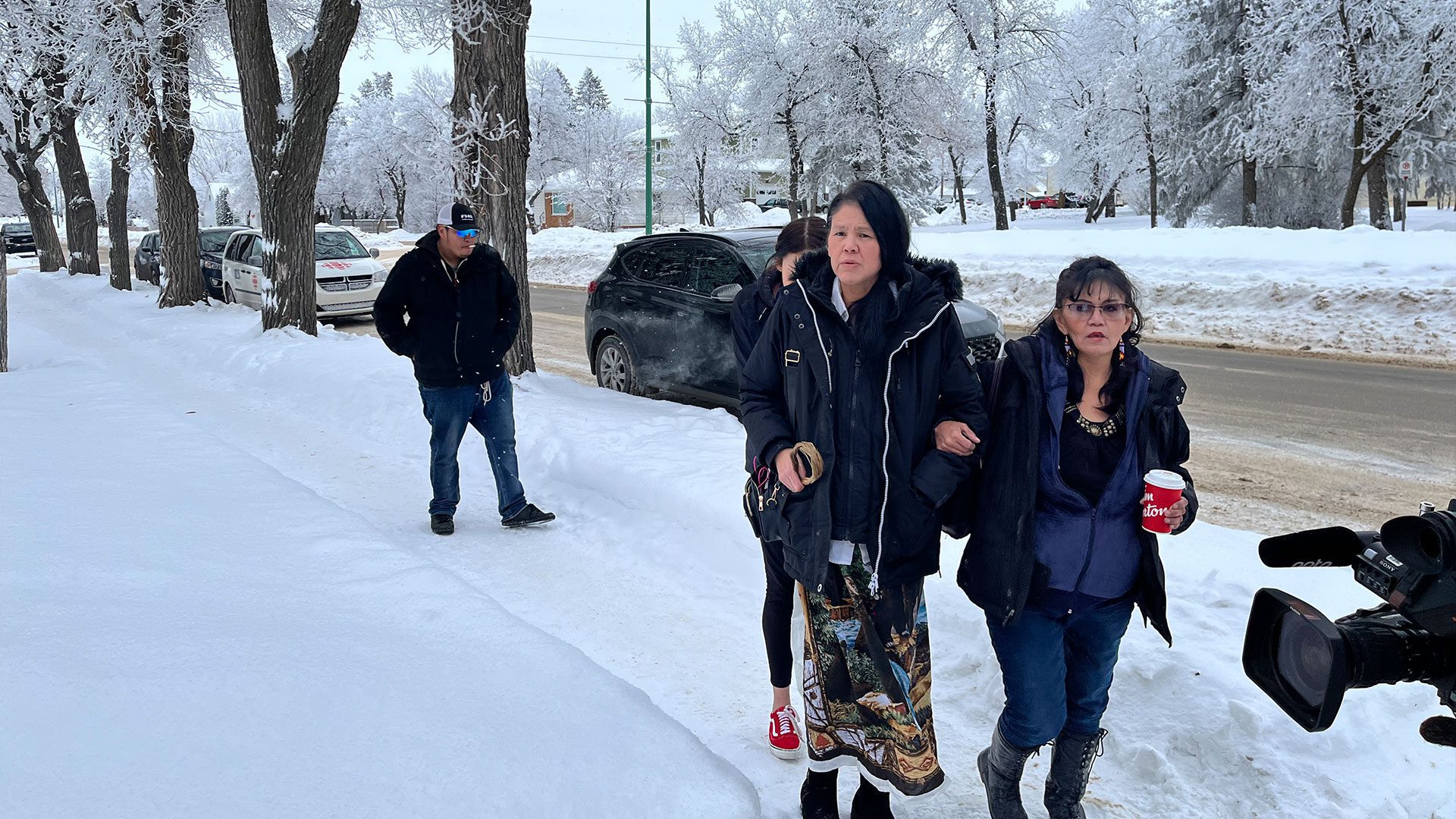In the small city of Yorkton Sask., Saulteaux sisters Nerissa and Odelia Quewezance smudged and hugged before walking into the courtroom for a two-day hearing that will decide on whether they’ll be released on bail.
“I am a strong believer in my prayers and my culture,” Odelia Quewezance, 50, said before the hearing.
“I’m nervous, but I feel strong. I have nothing to hide.”
Odelia has been in a halfway house in Regina since November 2022. Nerissa, 48, is in custody and arrived in shackles and handcuffs.
The sisters held eagle feathers during their testimonies.
The two were convicted in 1994 of second-degree murder in the death of 70-year-old farmer Anthony Joseph Dolff, near Kamsack, Sask.
Their cousin confessed to the crime in the preliminary hearings, during the sisters’ jury trial, and in 2020 during the APTN Investigates’ documentary A Life Sentence. He was sentenced to five years and has already been released.
Despite this, they were each sentenced to life in prison with no chance of parole for 10 years.
Defence lawyers are asking for the sisters to get a conditional release with limited conditions while their case is undergoing a federal conviction review for a possible “miscarriage of justice” dealing with their sentence. The review started in late 2022.
The Saskatchewan prosecutor’s office opposes the release of the sisters.
Testimony in support of the sisters

The sisters are gaining supporters as their journey continues. Senators, politicians, lawyers and former judges have commented on their case – and the length of time they’ve been in prison.
One of their supporters is Kim Beaudin, vice-chief of the Congress of Aboriginal Peoples who testified at the bail hearing on behalf of the sisters.
“This has been a long process, a very long process,” said Beaudin outside the courthouse. “I’m hoping that we’ll have some decisions actually being made today, that’s what we’re hoping for.
“It’s been a two-year process. It’s been really good because we’ve had a lot of high-profile advocates with us like David Milgaard for example and [Sen.] Kim Pate and Innocence Now.”
He added that he did not think that the process would take as long as it did.
“It feels really odd, I didn’t think it would take this long. But on the other hand, the way the justice system works in Canada, in terms of Indigenous people, how it impacts Indigenous People, it’s not a justice system for our people at all,” said Beaudin
If there were any thoughts the sisters would be freed on bail this week, Justice Donald Layh quickly put that to rest. He said he leaves Friday on vacation for four weeks and his decision won’t be delivered before that.
Nicole Porter, a criminal justice advocate who has worked with the sisters on an independent forensic analysis was at court in support of Nerissa and Odelia Tuesday.
“The federal review, it’s great that it’s happening, unfortunately, there’s only so many people who can do that review in the conviction review group… this could take up to two years. Ideally, we would like to see them go home on bail so they can be with their family and start the healing process.
“…our first step is today and getting them bail,” said Porter.
Nerissa
Kelly Kaip, senior Crown prosecutor in Saskatchewan, went through Nerissa’s sworn affidavit and asked what sort of support she would have. Nerissa discussed the services that she was exploring and the support that she would have when she was released.
Beaudin has offered to support Nerissa by having her live with him if she’s released on bail.
Nerissa agreed that she would not have any issues with electronic monitoring or a curfew. She also agreed to a urinalysis to monitor her drinking or drug use.
The Crown highlighted some of the achievements Nerissa had accomplished during her time in prison such as volunteering with a church in Vancouver.
Nerissa also worked with sex workers on the downtown east side when she escaped prison.
She was asked about past criminal records issues such as a public nuisance charge in 1992 and two convictions of obstructing peace officers and assault in 2003, where Nerissa spat on a police officer.
As APTN previously reported, the records show Nerissa, in particular, “has a lengthy history of breaches and being unlawfully at large. File information highlights a pattern of non-compliance after achieving conditional release or community supervision, and this is often the result of a relapse.”
In 2011, she missed a bus from Yorkton to Edmonton when she went out on what is called an unescorted temporary absence where she was allowed to leave prison for a fixed amount of time without an escort. She was found by police hiding in a closet. In 2022, Nerissa was unlawfully at large while on day parole.
“Even very recently is it fair to say you struggle with substance abuse? Is it fair to say you struggle with trauma?” asked Kaip.
“Well the trauma of being incarcerated for 30 years, yeah. The trauma of all the things I was exposed to in prison,” Nerissa replied.
The lawyer for the sisters, James Lockyer, asked whether she felt that she was institutionalized, a shorthand expression for the negative psychological effects of imprisonment, and what the impact of being incarcerated for so long had been.
“Yes,” said Nerissa.
Both sisters are also residential school survivors.
Odelia

During her questioning, Odelia highlighted that she has worked toward healing from substance abuse and self-harm.
“It is tough sitting there and you don’t only have to please yourself. You have family, CSC [Correctional Service of Canada], to please. I am proud of myself and where I am today,” said Odelia during questioning by Kaip.
Kaip also indicated that Odelia had racked up a number of charges that ranged from mild to serious during her time in prison.
To be closer to her family, Odelia transferred to a halfway house in Regina in November 2022. She was at the Eagle Women’s lodge in Winnipeg previously since 2020.
Odelia said she was having trouble adjusting to the halfway house, citing that there is a lot of criminal activity there and she has witnessed people overdosing.
“The drug overdoses there occur every day. The place where she’s staying there are four people sharing a bathroom. One leaves her needles all over the place,” said Koch
The prosecutor objected, calling this evidence hearsay.
Odelia said she has a close bond with her children, including two 15-year-old twins who, she said, she speaks to on the phone every day. Odelia is also close to her partner of 26 years, Jay Koch.
In addition, Odelia said she was a role model while there and participated in cultural and recovery activities. She is still in Alcoholics Anonymous and Narcotics Anonymous.
Odelia’s husband also spoke at the bail hearing. He was asked about being convicted of impaired driving. He was incarcerated for a short period of time for driving while intoxicated.
APTN called to the stand
APTN News executive producer Holly Moore was also called to the stand to testify. The Saskatchewan prosecutor’s office asked her about her time making the APTN Investigates documentary and whether interviews are edited before they appear on television.
Moore confirmed that not everything recorded makes it to air.
“There are a lot of complex considerations about television,” said Moore..
Kaip also took issue with the assertion that the sister’s have been in prison for 30 years when they have been on parole as well as escorted and unescorted outings. During the APTN documentary, Nerissa was considered unlawfully-at-large.
“I think we made it clear that they had been out on parole,” said Moore.
A lengthy discussion occurred between the defense, crown prosecutor and judge while Moore was on the stand regarding whether the documentary was considered fresh evidence. All parties maintained that it was not, but Kaip objected to the portrayal of the sisters as innocent in some media coverage.
APTN has reached out to the Dolff family for comment but they declined to be interviewed.










